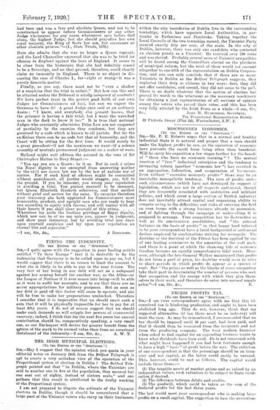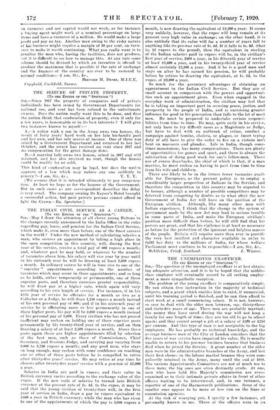EXCJiSS PROFITS TAX.
[To THE EDITOR Or THE " SPECTATOR."] see your correspondents agree with me that this ill- conceived tax is hindering production and ought to have been abolished long ago. They do not, however, think that my suggested alternative (if tax there must be on industry) will meet the case. As may be remembered, I recommended that no tax should be imposed until 10 per cent. had been paid, and that it should then be recovered from the recipients and not from the producing company. The busy modern financier when asked to find capital for an expanding business wants to know what dividends have been paid. He is not concerned with what might have happened if you had been fortunate enough to have a high "basis" of profit before the war. The criticism of one correspondent is that the percentage should be on turn- over and not capital, as the latter could easily be watered. This, however, could be met as follows. The capital would include three items:— (1) The tangible assets at market prices and as valued by an independent valuer, such valuation to be subject to State verifi- cation if desired.
(2) The difference between debits and credits.
(3) The goodwill, which could be taken as the sum of the declared profits for the last three years.
The last would meet your correspondent who is making large profits on a small capital. The suggestion to base the percentage
on turnover and not capital would not work, as for instance a buying agent might work at a nominal percentage on large items and have a turnover of a million. He would make a large profit and pay no tax. Another man owing to the risky nature of his business might require a margin of 30 per cent. on turn- over to make it worth continuing. What you really want is to penalize the man who, haring the facilities, does not produce, ;nit it is difficult to see how to manage this. At any rate some scheme should be devised by which an incentive is offered to produce the maximum that is possible if the rate of exchange and the finances of the country are ever to be restored to normal conditions.—I am, Sir, &c.,
BERNARD M. DRAKE, M.I.E.E.
Copyhold, Cuckficld, Sussex.







































 Previous page
Previous page